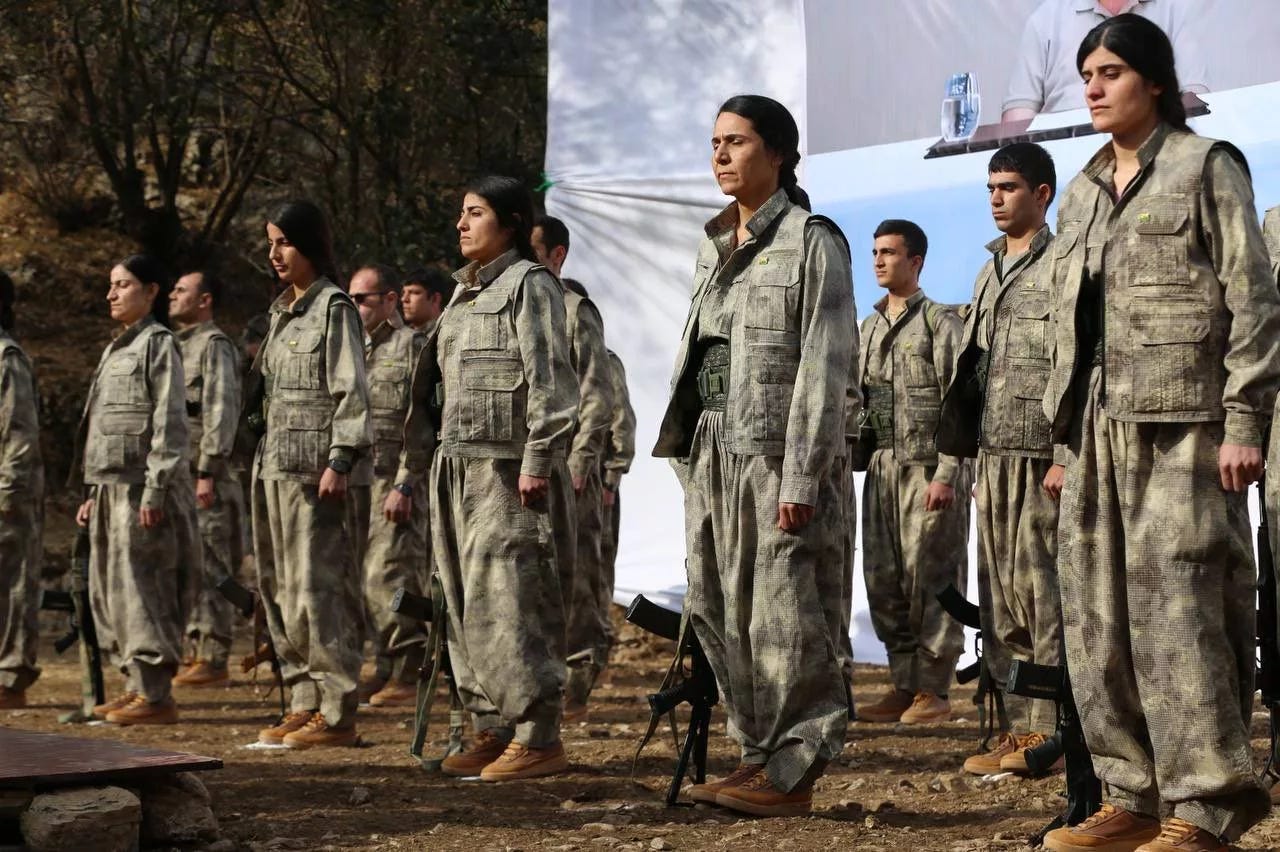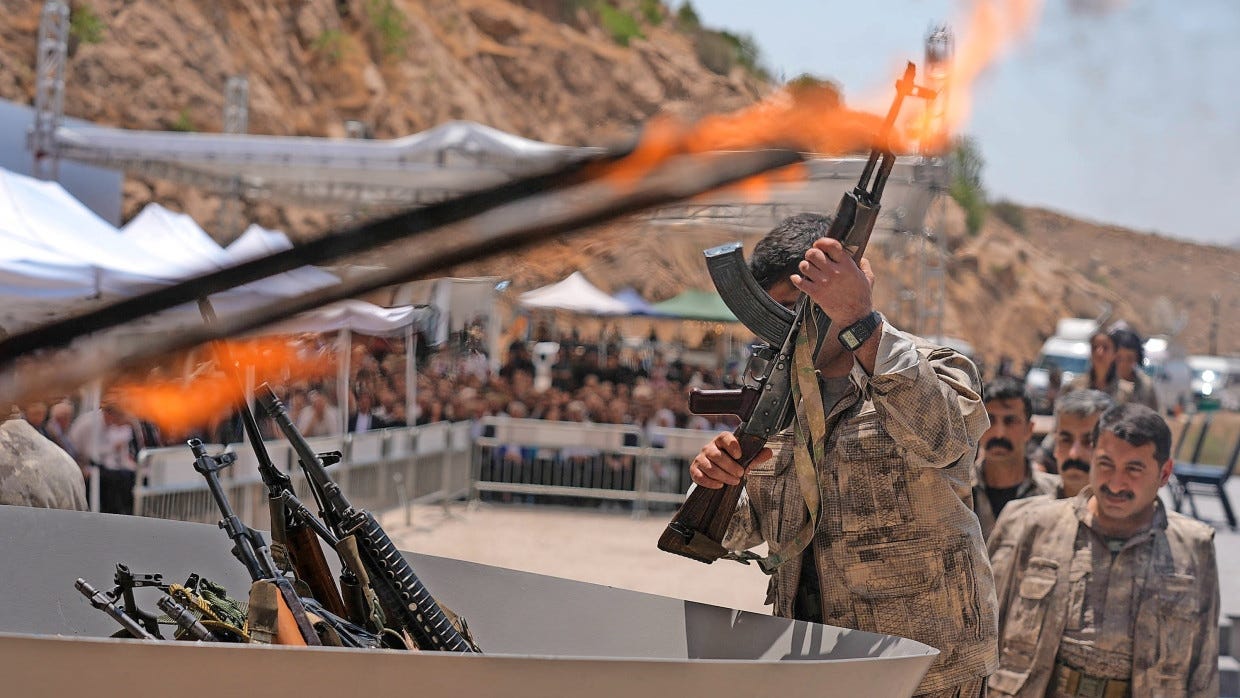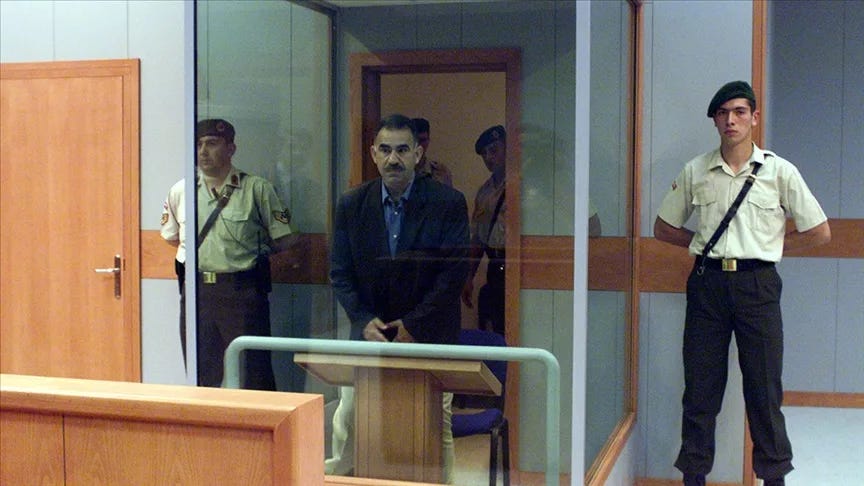
Over the past few months, the “Terror-Free Turkey” initiative has undergone a dramatic shift, following the Kurdistan Workers’ Party (PKK)’s formal renunciation of armed struggle an unprecedented step taken in direct response to the appeal of its imprisoned leader, Abdullah Öcalan.
In May, the group officially ended four decades of armed resistance, a conflict that has claimed more than 40,000 lives.
The first symbolic gesture of this transformation came in July, when PKK fighters held a ceremonial burning of their initial batch of weapons in the Qandil Mountains of northern Iraq, marking the beginning of a disarmament process.
On October 26, the PKK announced the withdrawal of all its fighters from Turkish territory to northern Iraq a move coordinated with the Turkish government and widely viewed as the clearest indication yet of the group’s intent to turn the page on armed resistance.
During a field event in Qandil, 25 fighters, including eight women, became the first officially acknowledged group to leave Turkey. Weapons were again burned during the ceremony as a symbolic affirmation of commitment.
In Ankara, the move was cautiously welcomed. The Turkish presidency’s communications director called it a “positive and strategic” step within the framework of the “Terror-Free Turkey” initiative. President Recep Tayyip Erdoğan described the July disarmament ceremony as “a new chapter in history,” signaling a shift toward a Turkey free of violence.
These unprecedented developments have opened the door for the Kurdish issue to move from the battlefield to the political arena, laying a realistic foundation for a resolution that has long seemed out of reach.
What Has Been Achieved So Far?
On the ground, the effects of the initiative are becoming increasingly tangible. Since the PKK declared a ceasefire and began withdrawing its fighters, the sound of gunfire has largely fallen silent, and the frequency of clashes in the southeast once almost daily has sharply declined.
The Turkish government has acknowledged the shift. In a recent speech, President Erdoğan stated that the country had “entered a new phase in the fight against terrorism,” describing current progress as a turning point in eliminating internal threats and laying the groundwork for lasting peace.
For the PKK, dissolving its military wing and abandoning arms marks the formal end of the longest-running insurgency in the Republic’s history, dating back to its founding in 1923. The group has begun its transition from armed resistance to peaceful political activity, in line with Öcalan’s call from prison for his supporters to “channel the energy of resistance into a democratic project.”
These developments have resonated positively among many Kurds, who view the current calm as a long-overdue opportunity after decades of violence, displacement, and loss.
The Role of the Parliamentary Committee
Alongside this de-escalation, Ankara has moved to reinforce the initiative with a series of political and institutional steps. Chief among them is the formation of a special parliamentary committee called the “Committee for National Solidarity, Brotherhood, and Democracy,” chaired by Parliament Speaker Numan Kurtulmuş and comprising members from various political parties.
Tasked with shaping the social, legal, and political framework for the post-conflict phase, the committee is working to establish legislative foundations that will transition the country from a security-focused approach to sustainable reconciliation.
Since its formation, the committee has held a series of intensive hearings in Ankara, gathering input from ministers, security officials, legal experts, civil society representatives, and families of fallen soldiers, in an effort to pursue a comprehensive peace formula that leaves no voice unheard.
In parallel, the government has opened political channels with legitimate Kurdish opposition parties. The People’s Equality and Democracy Party (HEDEP) the successor to the Peoples’ Democratic Party (HDP) has acted as a mediator between the state and the PKK’s imprisoned leadership.
As the third-largest bloc in parliament, HEDEP has facilitated indirect communication between Ankara and Öcalan in recent months and enabled parliamentary delegations to visit İmralı Island. The latest such visit occurred on November 3.
In a notable development, President Erdoğan held a closed-door meeting on October 30 with HEDEP leadership, including former co-chairs Pervin Buldan and Mithat Sancar. He described the discussion as “constructive and positive,” noting both sides’ agreement on the need to proceed cautiously and steadily.
Political momentum peaked when the parliamentary committee announced plans to hold a session on November 6 to discuss sending an official delegation to meet with Öcalan, following a surprising proposal from Nationalist Movement Party (MHP) leader Devlet Bahçeli long known for his hardline stance against any Kurdish dialogue. His public support for the idea and his party’s willingness to participate stunned political observers.
In the coming weeks, the committee is expected to submit a comprehensive report to parliament, including legislative recommendations to prepare for a legal reform package promised by President Erdoğan. The reforms are set to address the legal status and reintegration of former fighters.
Key Demands
As the initiative gains momentum, several critical demands have emerged in discussions tests, many say, of the government’s true commitment to comprehensive peace.
Release of Selahattin Demirtaş
One of the most prominent figures in the current phase is Selahattin Demirtaş, former co-leader of the HDP, imprisoned since 2016 on terrorism-related charges. His case has become a barometer of state-Kurdish relations. After the European Court of Human Rights ruled his detention arbitrary and called for his immediate release, pressure mounted both domestically and internationally.
In a notable shift, MHP leader Bahçeli stated on November 4 that “releasing Demirtaş would be good for Turkey” widely interpreted as a political green light for his possible release.
Ending Government Trusteeships Over Elected Municipalities
The imposition of government-appointed trustees over elected Kurdish municipalities remains a major point of contention. Since last year, dozens of elected mayors in the southeast have been dismissed and replaced under emergency laws. Kurdish political forces, particularly HEDEP, argue that restoring local governance is essential to rebuilding trust and reviving democratic life.
The Future of Abdullah Öcalan and the “Right to Hope”
Öcalan, imprisoned since 1999, remains the most sensitive figure in the current landscape. While the state regards him as the primary architect of decades of violence, many Kurds view him as a key to peace.
Kurdish factions are calling for him to play a role in the ongoing process either through improved prison conditions and regular visitation rights or even conditional release if disarmament is completed.
Ankara has hinted at invoking the “right to hope” a principle upheld by the European Court of Human Rights which allows for life sentences to be reviewed after 25 years, with the possibility of parole. Bahçeli was the first to open that door last year, stating that Öcalan “could be given hope if he declared an end to terrorism.”
Disarmament and Reintegration Mechanisms
The initiative now enters its most sensitive phase: implementing practical mechanisms for disarmament and the reintegration of PKK fighters into society.
So far, implementation has been cautious and only partially disclosed to prevent setbacks or miscalculations. After the symbolic summer disarmament ceremonies, a gradual collection and disposal of heavy weapons is expected to begin under trusted oversight.
In exchange, the PKK leadership demands a conditional legal amnesty and security guarantees, via a special law that defines former fighters’ legal status distinct from a general amnesty. This law would set clear terms for prosecution or exemption, and outline pathways for professional, economic, and social reintegration marking a shift from a security paradigm to transitional justice.
Nonetheless, execution is fraught with political and security challenges. Mutual distrust lingers: the PKK is unlikely to surrender its remaining arms without assurance that reforms will be honored, while Ankara fears a repeat of 2015, when a ceasefire was exploited to regroup.
Thus, the process is expected to follow a step-by-step model each move by the PKK met with a reciprocal step from the state until reaching what political circles call “the point of no return on the path to peace.”
Politically, the reintegration initiative faces staunch nationalist opposition, with some viewing it as a betrayal of “martyrs’ blood.” To counter this resistance, the government is planning a broad public awareness campaign to frame reconciliation not as a reward for former fighters, but as an investment in national stability and long-term security.
Passing substantive legislative changes will also require broad political consensus a difficult task in a fragmented opposition landscape.
Amid these entangled challenges, Turkey faces a historic yet risky opportunity: either it succeeds in institutionalizing peace and closing the chapter on four decades of conflict, or it stumbles under internal divisions and regional pressures. One thing is clear: a truly terror-free Turkey can only be realized through a balanced, deliberate process that combines firmness with flexibility, and justice with hope.




